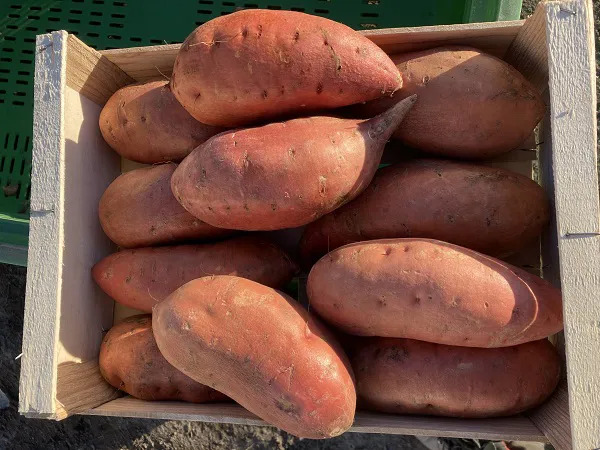Benoit Labouille started growing sweet potatoes in 2015, wanting to offer a product from France to supermarkets and wholesalers. Initially, the producer only supplied the local market, but the need to expand sales has led him to turn to supermarkets as well. Today, Benoit Labouille owns almost 40 hectares of conventional and organic land. On his farm in the Nouvelle-Aquitaine region, he also produces organic potatoes.
The SCEA Pinchagut started planting at the beginning of May and will harvest from the end of August for marketing from September to April. Part of the crop is marketed directly, and the rest through Fruidor Terroirs throughout France.
Sandy Sweet Potatoes
Benoit markets his sweet potatoes under the brand name Patates Douces des Sables, in reference to the sandy soil on which they are grown. “This type of soil enables the tuber to develop evenly and regularly. The color of the skin is also redder and brighter.” Other advantages include their taste, of course, and the absence of wireworms, responsible for holey, misshapen tubers. “It is a very sweet product, with no taste of soil thanks to our mastery of curing.” This involves storing the sweet potatoes for several days at a temperature of 30°C. “In order to improve their taste, we heat them so that the starch turns to sugar, the skin hardens and it can then be stored for several months. We practice curing on 100% of our products to ensure optimum taste quality.”

There is a definite craze for sweet potatoes but, according to Benoit, the market of organic sweet potatoes is beginning to saturate, with supply exceeding the demand.
A complex crop
“Sweet potatoes are a difficult crop to work with,” explains Benoit. In the fields, pests are not the biggest challenge, the main problem is weed control. “If there is enough heat, the agronomic obstacles to production may seem limited. But the absence of authorized weed control solutions and the lack of substitutes poses a major challenge. Weed management has become quite complicated. We have to spend a lot of time weeding by hand, for both organic and conventional crops.” Other difficulties include storage, which requires real expertise, and harvesting, which is labor-intensive and delicate to avoid damaging the sweet potatoes. Labor has also become increasingly scarce, which has limited the development of production.
For more information:
SCEA de Pinchagut
Pinchagut 33113 Bourideys
Phone: 0609935607










